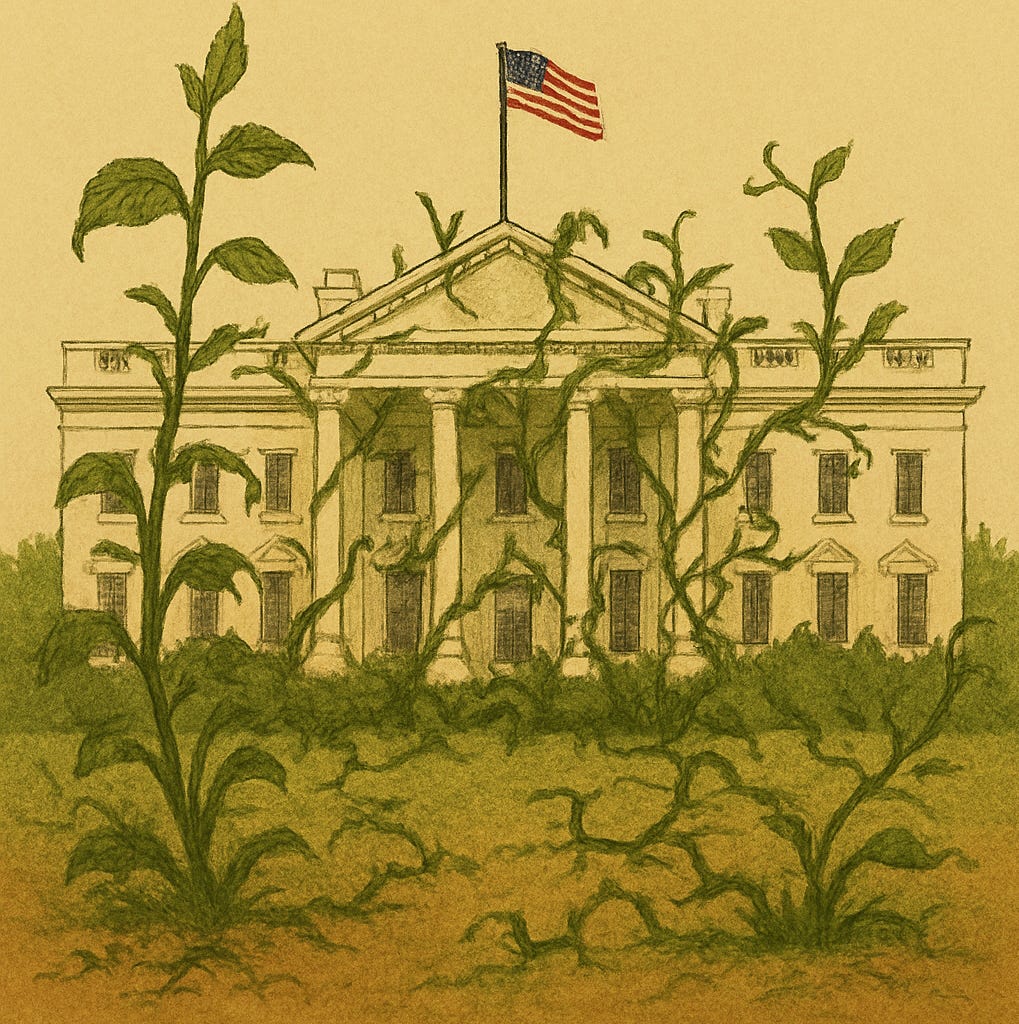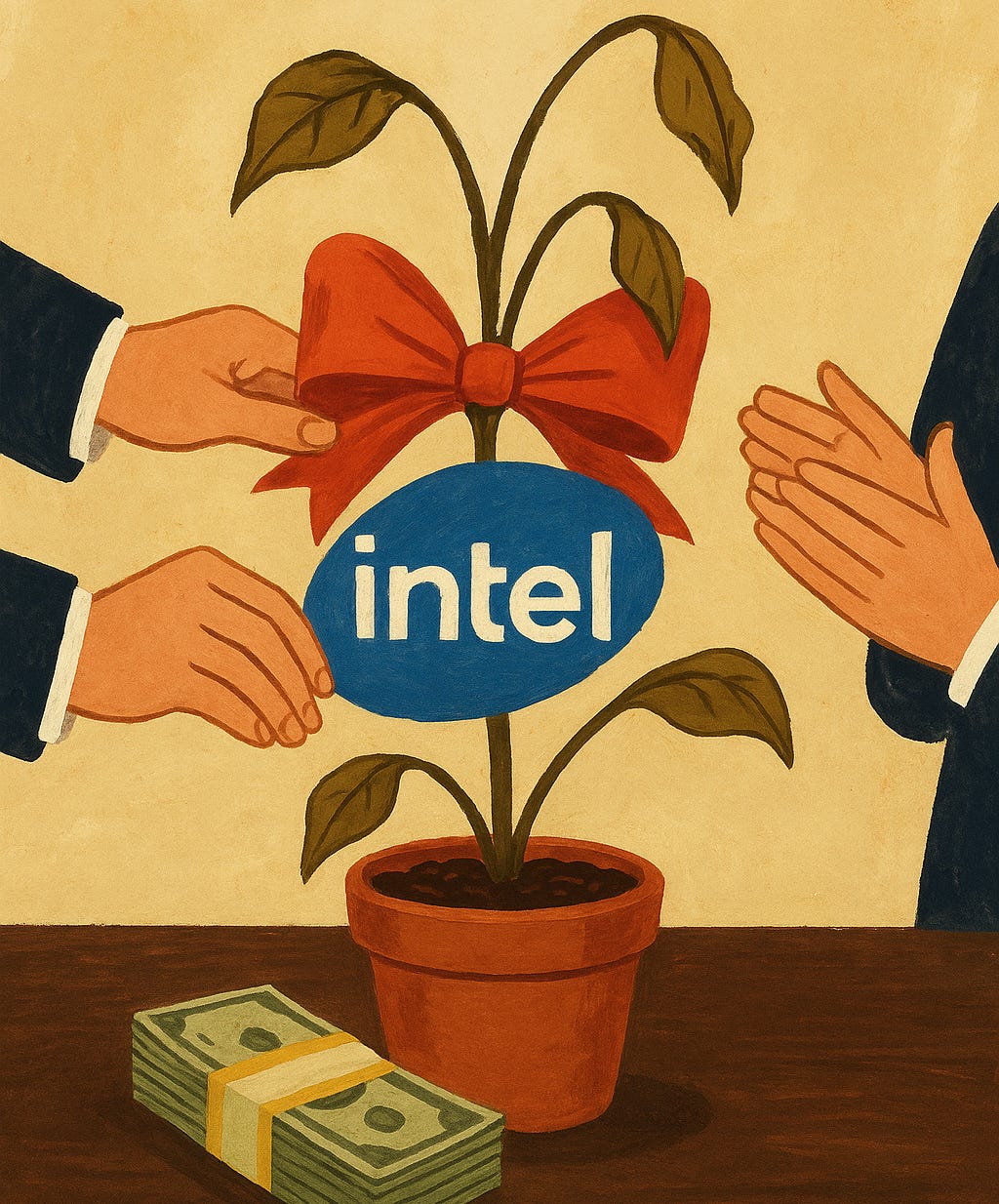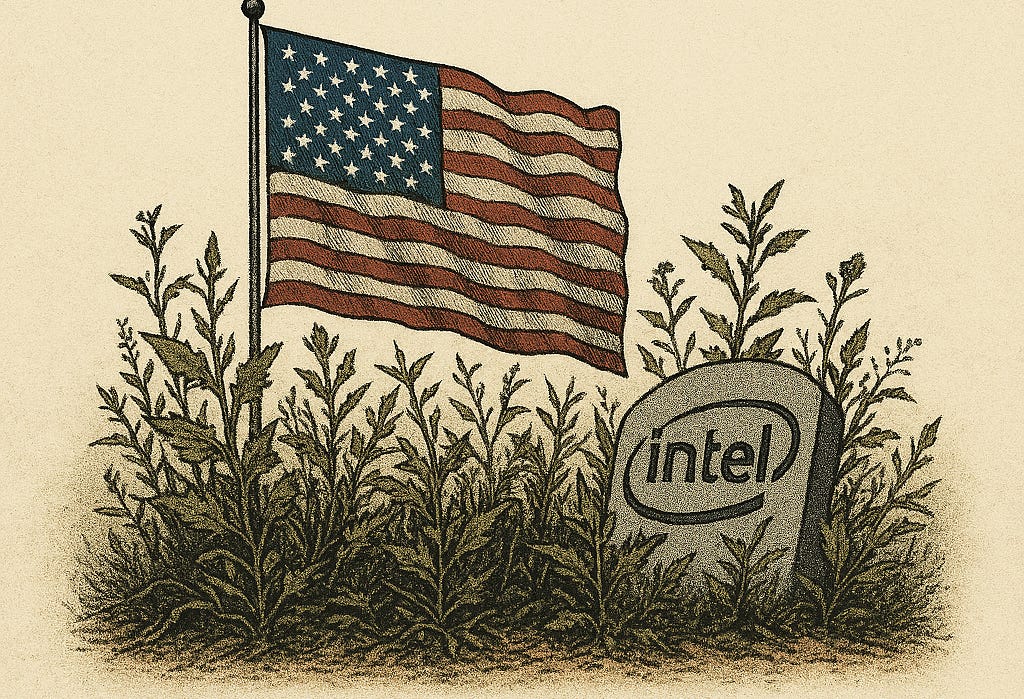The Weeds We Subsidize
Chaos Garden: Installment I: What Grows When Neglect Is Legislated (1/5)
Disclaimer: This assessment is for informational purposes only and is non-partisan. All things in life are neutral until you put perspective. My goal is to address the facts and apply scrutiny through curiosity. Any statements that could be interpreted as opinion do not reflect the views of any past, current, or future employers. I encourage you to do your own due diligence, utilize critical thinking, and make your own opinion.
There’s a difference between planting and subsidizing. One requires intention. The other rewards inertia.
In August, the Trump administration finalized a $10B equity stake in Intel, converting CHIPS Act grants into a 9.9% ownership position. The move was framed as historic. A patriotic investment in American manufacturing. A strategic play for national security. But beneath the press release lies a breach: a government rewarding dysfunction, mistaking proximity for performance, and legislating neglect as innovation.
Let’s be clear: this isn’t stimulus. It’s symbolism. And symbolism, when subsidized, becomes ornamental nationalism.
The $10B “investment” in Intel isn’t just flawed. It’s structurally incoherent; so bad it defies intelligent counterargument. Intel’s liquidity crisis isn’t a national emergency. It’s the consequence of years of mismanagement, strategic drift, and cognitive decay at the executive level. The markets will dictate its future. Not the Treasury. Not the White House. And certainly not a bailout disguised as patriotism.
This isn’t “too big to fail.” It’s too UN-INTEL-LIGENT to revive.
Intel isn’t Mr. Right. It’s not even Mr. Good Enough for Right Now. And yet, the U.S. is dragging it onto fiscal life support while slashing academic research, the very infrastructure required to incubate the next TSMC. You don’t outperform Taiwan by ventilating legacy firms. You do it by funding intellectual scaffolds, not burning them down.
This isn’t industrial policy.
It’s Peter Pan economics: death to intellect, hope in nostalgia, and a refusal to grow up.
If you called Obama’s auto rescue “communism” and now celebrate the Intel scheme as smart policy: Sit down. Be quiet. And reflect on how this modern-day “Fahrvergnügen” bailout will cost the republic more than just money.
Again: this scheme is simply un-INTEL-ligent, bad for the markets, and bad for the republic.
Danger to the Republic
Put down your red, blue, and purple ties. And process this without party loyalty.
The executive branch investing in private companies isn’t patriotism. It’s a festival of conflicts of interest; cronyism dressed as strategy.
Time to invoke the veil of ignorance. Play the game:
Imagine the party you distrust controlling industry from inside the boardroom with your tax dollars.
Imagine procurement pipelines redirected to favored firms.
Imagine federal contracts awarded not on merit, but on proximity.
If you think lobbyists legally buying influence is bad now, imagine what happens when the president and their inner circle aren’t just adjacent to power, but eating from its palm. Literally.
This isn’t oversight. It’s entanglement. And the risks aren’t theoretical:
Procurement overreach shaping ideological outputs→ chilling innovation and speech.
State-level regulatory fragmentation→ negating federal deregulatory gains.
Compliance burdens→ disproportionately crushing small and mid-sized vendors.
Dependency architecture→ locking in legacy firms at the expense of redesign.
Interagency inertia→ rulemaking without follow-through.
Nobody wants this. Not when they think about it. Not when they strip away the tribal colors and look at the scaffolding.
Capitalism is a chaos garden. Firms rise and fall based on innovation, not insulation.
A China-style crony system isn’t just bad policy. It’s anti-American. This is not a communist country. And nostalgia isn’t a substitute for governance.
In chaos gardens, weeds aren’t accidents. They’re signals. They tell you what the soil rewards. What survives neglect. What metabolizes dysfunction. And right now, our policy soil is rewarding ornamental clarity over strategic fidelity.
Here’s what’s breachable:
The myth of oversight through ownership- A 10% stake doesn’t guarantee accountability. It guarantees entanglement.
The collapse of merit logic- Intel’s manufacturing struggles weren’t solved. They were subsidized.
The erosion of public trust- When government plays investor, taxpayers inherit the risk. And the weeds.
This isn’t a call for austerity. It’s a call for fidelity. For policy that rewards redesign, not performance. For governance that plants with intention, not optics.
In chaos gardens, what blooms is what survives contradiction. What thrives is what refuses control. And what redesigns is what metabolizes breach.
So ask yourself: What part of your system rewards wild growth, and survives misrecognition?
Next Thursday: Syntax in the Soil: On language as compost. Essays that refuse ornamental polish and metabolize emotion into grammar…Spoiler: clarity isn’t clean. It’s fermented.Like this piece?
Consider subscribing, pledging, or buying me a cup of coffee, whatever keeps the signal alive and the nonsense metabolized.
The Chaos Garden is a five-part essay arc threaded across each of my Substack sectors. It’s not a metaphor for disorder. It’s a design logic for survival. Each installment carries a motif that mutates under pressure. Misrecognition becomes emotional imperfection. Fidelity becomes ecological tension. Defiance becomes redesign.
The series will publish every Thursday
Each Thursday, a new installment will drop, strategically threaded across one of the five sectors: Policy Without Apology, Unsentimental Letters, Boardroom Mechanics, Profit & Play, Working Under the Unqualified.
And because this space is built for more than serialized architecture, I’ll continue publishing standalone pieces every Monday: essays, critiques, and tactical reflections independent of the Chaos Garden arc. Mondays are for the unexpected. Thursdays are for the thread.
References
Lincicome, S. (2025, August 27). Intel again, unfortunately. Cato Institute. https://www.cato.org/commentary/intel-again-unfortunately
Lawfare. (2025, August 28). The legal bases for government stakes in private firms. Retrieved from https://www.lawfaremedia.org
Politico. (2025, August 22). Trump is turning the government into an investment firm. Retrieved from https://www.politico.com
GovFacts. (2025). Can the US government own American companies? Retrieved from https://govfacts.org
Congressional Budget Office. (2003). Evaluating and accounting for federal investment in corporate stocks. Retrieved from https://www.cbo.gov
National Institute of Standards and Technology. (2023, September 25). Preventing the improper use of CHIPS Act funding: Guardrails Rule. Retrieved from https://www.nist.gov
Lincicome, S. (2025, August 24). The government’s Intel stake is antithetical to American greatness. Cato Institute. https://www.cato.org/commentary/governments-intel-stake-antithetical-american-greatness
Associated Press. (2025, August 23). Trump turns $11.1B in U.S. government funds into a 10% stake in Intel. Broadband Breakfast. https://broadbandbreakfast.com/trump-turns-11-1b-in-u-s-government-funds-into-a-10-stake-in-intel/
Forbes. (2025, August 25). Trump attacks critics of Intel deal and promises more private industry deals. Forbes. https://www.forbes.com/sites/saradorn/2025/08/25/trump-attacks-critics-of-intel-deal-and-promises-more-private-industry-deals/
BBC News. (n.d.). [Title of article]. BBC News. https://www.bbc.com/news/articles/cn85n2vg04go
Wall Street Journal. (n.d.-a). [Title of WSJ article on Intel-government stake deal]. The Wall Street Journal. https://www.wsj.com/tech/intel-government-stake-deal-ed7d911b
Wall Street Journal. (n.d.-b). [Title of WSJ article on CHIPS Act waiver]. The Wall Street Journal. https://www.wsj.com/tech/intels-chips-act-requirements-waived-after-u-s-government-takes-stake-e0ec5cdb
PwC. (2024). The CHIPS Act: What it means for the semiconductor ecosystem. Retrieved from https://www.pwc.com
Exiger. (2024, February 9). How supply chains gain from the CHIPS Act and its risk-mitigation stand. Retrieved from https://www.exiger.com
Harvard Gazette. (2025, July 21). Snapshots from front lines of federal research funding cuts. Retrieved from https://news.harvard.edu
C&EN. (2025, August 12). US science research was gutted in 2025. How will it rebuild? Retrieved from https://cen.acs.org






great writing and perceptive.
What struck me most is how you framed the difference between planting and subsidizing; one takes intention, the other feeds inertia. It feels like such a sharp metaphor for the current moment, where symbolism is dressed up as strategy. I appreciated the way you peeled back the layers of Intel’s bailout. It’s not just about economics but about what happens when governance rewards proximity over performance, nostalgia over redesign.
Thank you for writing this in a way that is clear but still layered, analytical yet deeply human. You reminded me that capitalism really is a kind of chaos garden and what grows says more about neglect than intention.